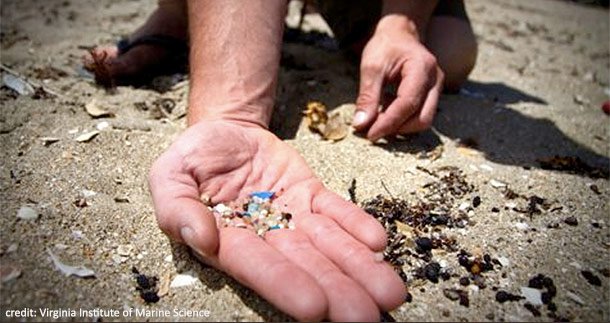Removing Harmful Microplastics from New Jersey’s Waterways and Wildlife
Nation Follows New Jersey’s Lead in Banning Microbeads
by Jake Levine, Intern

Have you ever used a skin-care product with those “exfoliating” beads? Have you ever used toothpaste that guarantees a brighter smile with its “abrasive” powers? The small plastic microbeads found in those products — and many other cosmetics — are polluting waterways and affecting wildlife. These small plastic microbeads are all less than five millimeters in size. Although they are tiny, they can have some colossal impacts on the waterways and the wildlife that inhabit these ecosystems.
What makes these microbeads so detrimental to the waterways and wildlife is its chemical composition. Commonly called plastic, polymers have been one of the most revolutionary creations in industry. They are strong, lightweight, and last a lifetime… literally. A key characteristic of polymers is long decomposition rate. Instead of naturally breaking down, they photo-degenerate, which means they absorb sunlight to break apart. When found in waterways, the rate that they break down is much longer, since the surrounding water keeps the microbeads cool and can redirect the sunlight. In animals that depend on waterways for food, these microbeads put up a fight against their digestive systems. These polymers do not break down in their digestive systems, which can pose a serious health risk to wildlife.
In a standard food chain, the smaller organisms make up the foundation. This foundation provides the energy and nutrients needed to fuel the rest of the food chain. With the introduction of microbeads into waterways, the foundation of the food chain now also contains microbeads. Since microbeads are made of polymers, they offer no nutritional value to any of the organisms that consume them. In addition to not being able to decompose or break down in wildlife, these small pellets can quickly cumulate inside animals, leading to fatal health issues.
So what is being done about the microbead issue? In 2015, legislators passed a bill that will prohibit the selling and distributing of these products that contain microbeads, and you can thank New Jersey for leading the charge! The “Microbead Free Waters Act of 2015” will ban the manufacturing, introduction, or delivery for introduction into our commerce of products that contain intentionally-added microbeads. The ban on the manufacturing will begin on July 1, 2017, while the ban on commerce will begin July 1, 2018.
The ban is one step, but I am anticipating it to lead to something bigger towards the recovery of the waterways and the environment.
Learn More:
- CNN: Microbead ban signed by President Obama
- Newsworks: U.S. follows New Jersey’s lead in banning microbeads
Jake Levin is an intern for Conserve Wildlife Foundation of New Jersey.